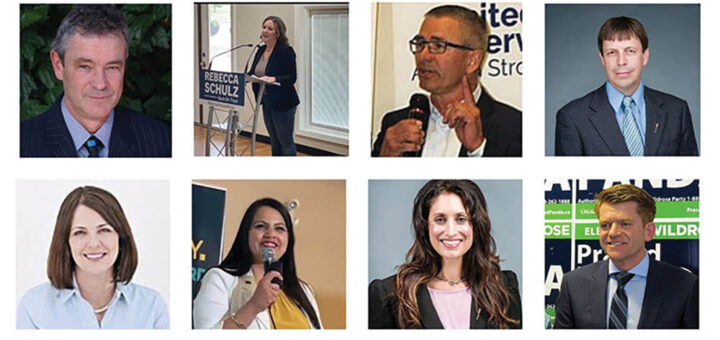Kenney resigns, UCP finds a new leader

By Leonardo Galindo, Contributor
The United Conservative Party (UCP) of Alberta has been in the midst of a tumultuous leadership race to choose its next party leader upon Premier Jason Kenney’s resignation in May this year after a leadership review determined Kenney fit to be a leader at only 51.4 per cent. Seven candidates have put their names forward with a variety of platforms ranging from inflation relief programs to an act making Alberta autonomous and more.
In that leadership review, voters were asked “do you approve of the current leader?”. According to CBC, Out of the 34,298 votes cast, 51.4 per cent of voters approved and 48.6 per cent disapproved. While under the party’s constitution, a leader may still technically hold the office with a “fifty per cent plus one” approval.
This was not enough to convince Kenney to maintain his position, stating that “while 51 per cent of the vote passes the constitutional threshold for a majority, it clearly is not adequate support to continue on as leader.” The leadership race was called shortly after May 19 when the UCP caucus voted to allow Kenney to remain as leader until a new leader is elected by the party.
Registered UCP members, which according to party sources, reached a record of 123,915 Albertans, began receiving ballots in the mail on Sept. 2 with a submission deadline of Oct. 3 at 5 p.m. The current membership figure is a drastic jump from the 87,000 members the party had when it was first established in 2017.
Cynthia Moore, president of the UCP, said “Alberta’s Conservative movement is incredibly strong, and these numbers prove it.” The party has rules and procedures for each of its leadership elections. According to this year’s guide, the party requires that all candidates pay a $150,000 entrance fee, a $25,000 refundable deposit for compliance and gather 1,000 signatures – including 200 from each of the party’s five provincial regions – in order to qualify.
David Price, chair of the party’s leadership election committee, explains that these steps are designed to highlight the fact that “we’re not just selecting the leader of the party, but the next premier of the province.” Here are the leading candidates.
Leela Aheer
Leela Aheer began her career in politics in 2015 when she was elected Member of the Legislative Assembly (MLA) for Chestermere-Rocky View. Prior to this, she was a music teacher, vocal coach, entrepreneur, and was heavily involved in community service initiatives. Her most recent political positions have been as MLA for Chestermere-Strathmore and as Alberta’s Minister of Culture, Multiculturalism and the Status of Women, a position she held until July 8, 2021, when she was reshuffled after publicly criticizing Jason Kenney.
Her platform includes commitments to “Transparency and Integrity”, “Stability and Progress”, and “Value for Money Services”. The two main policy proposals she is running with, Fiscal Resilience and Alberta Justice, are aimed at addressing the ‘Fiscal Roller Coaster’ affecting the provincial economy and refocusing the mandate of the Alberta Justice System, particularly in regards to legal aid funding.
Aheer has been at the forefront of several media stories after she jumped in front of a charging bull to help a rodeo participant at the Strathmore Stampede this summer. Her Facebook accounts were also the target of an unfortunate hack posting sexually exploitative content on her personal and public accounts. She has since reported the incident to police for investigation and received support from other candidates and even the opposing New Democratic Party (NDP).
Rebecca Schulz
Rebecca Schulz began her political career in Saskatchewan in 2009 as a staffer in former Premier Brad Wall’s office. She entered Alberta provincial politics in 2019 when she was elected MLA for Calgary-Shaw and served as Cabinet Minister for Children’s Services.
During her time in the portfolio, she successfully negotiated a much anticipated deal for provincial child-care funding in tandem with the federal government’s $10-a-day childcare plan. Schulz’s campaign is focused on getting Alberta and the UCP “Back on Track” and move past the “infighting, chaos and elites” that she claims have mired the party since the pandemic.
Her campaign’s rhetoric contains messaging to ‘unleash’ Alberta’s full potential, beat Rachel Notley’s NDP and assert Alberta’s place in confederation. Schulz’s key policy priorities include an 100 Day Provincial Rights Strategy which will pursue the establishment of an Alberta Pension Plan, Alberta Employment Insurance and Alberta Revenue Agency and pursue further reforms to reduce Federal-Provincial overlap. Her priorities also include revamping the healthcare system to empower front-line staff and proposals to combat the rising cost of living.
Rajan Sawhney
Rajan Sawhney was an MLA for Calgary-North East, first elected in 2019. She has held two cabinet positions as Minister of Community of Social Services and more recently as Minister of Transportation. Before politics, Sawhney worked as an Oil and Gas Economist for 20 years.
Her priorities include fiscal responsibility; making Alberta a global leader in energy, agriculture, and technology; social services; and a public inquiry into the Province’s response to the COVID-19 pandemic. Sawhney’s notable policy proposals are the Civil Society Act, strengthening the powers of the Intergovernmental Affairs Ministry and re-indexing social assistance programs and tax brackets to inflation. She has been a sharp critic of Danielle Smith’s “Sovereignty Act” claiming that the legislation is unconstitutional and will drive investment out of the province.
Brian Jean
A notable figure in Canadian politics, Brian Jean has held several positions at the Federal level as a Member of Parliament (MP) with the Conservative Party of Canada for Fort McMurray-Athabasca from 2004 to 2014. After a brief break, he returned to political life in 2015 when he served as leader of the Alberta Wildrose Party and official opposition against the then NDP government of Rachel Notley until the formation of the UCP in 2017.
Brian Jean has been the most outspoken critic of Jason Kenney. He has been very vocal with his belief that the party is “doomed to fail” under Kenney’s leadership and spoke out during a legislative question period to suggest that the current government is failing to fight for a fairer deal for Alberta in confederation.
Based on this, it is not surprising that Jean’s election platform is all about “Autonomy for Albertans”, particularly highlighting the Autonomy for Albertans Act. The proposed legislation contains a series of measures – including negotiations to amend the constitution – in order to increase provincial autonomy away from Ottawa.
Todd Loewen
Loewen is an Independent MLA for Central Peace-Notley originally elected in 2015. He was kicked out of the UCP caucus for causing ‘divisive actions’ that contributed to internal party fractures. He was quite outspoken over pandemic-era restrictions, saying the mandates in place eroded the freedoms of Albertans.
His main priorities are protecting Alberta’s energy and agricultural sectors from the federal government’s environmental policies. Particularly, his platform makes note of the federal government’s 30% reduction in fertilizer usage and how this will affect Alberta agriculture. However, a careful reading of the federal target implies that only emissions intensity from fertilizers should be reduced, not fertilizer use in itself.
Travis Toews
Accountant, rancher and business-owner-turned-politician Travis Toews is a leading figurehead in the leadership race. He was elected in 2019 as MLA for Grande Prairie-Wapiti and appointed Minister of Finance and Minister of the Treasury Board by Jason Kenney. As Alberta’s most recent finance minister, he announced a balanced budget in his 2022 budget speech, making that feat the second time to be achieved by the province since 2008. His campaign slogan is all about serious, formidable leadership for the province. Out of all the candidates, he has received the most endorsements from the UCP caucus. Toews has proposed policies for supporting Alberta farmers, introducing inflation relief programs and creating a stronger provincial healthcare system.
Danielle Smith
Smith served as leader of the Wildrose Party from 2009 to 2014 until she made a historical move to cross the floor to join the Progressive Conservative Association of Alberta. She has extensive experience in print media, radio and journalism and served as MLA for Highwood until announcing her leadership bid.
Smith’s campaign has brought her national attention due to her front-running policy proposal: The Alberta Sovereignty Act. The legislation, which has not been drafted thus far, would assure the authority of the provincial legislature to refuse to enforce certain federal laws that violate jurisdictional rights guaranteed under the constitution or that infringe upon the Charter of Rights of Albertans.
Smith’s website explains that the act isn’t necessarily about separation from Canada, but rather following Quebec’s example of effectively having Alberta govern itself as a ‘Nation within a Nation’. Experts, opposing candidates, and the sitting premier have all expressed doubts about the constitutionality of the sovereignty act and the practical implications it will have on investments and the Alberta economy.
What’s it going to be?
According to a poll conducted by Leger this month, 44 per cent of Albertans favour the UCP over 41 per cent favouring the NDP. Among the Albertans surveyed, Brian Jean emerged as the candidate most likely to secure the leadership.



